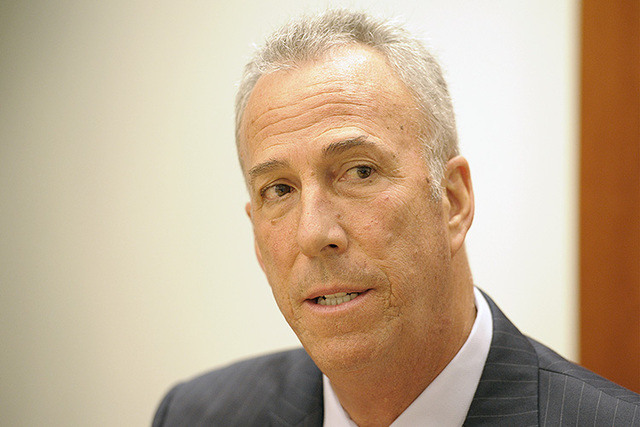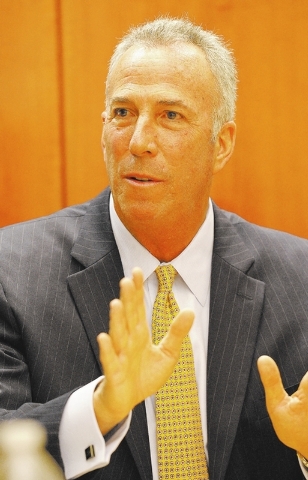Vegas DA’s witness payment account remains a mystery
The Clark County legal community was stunned last month to learn that the district attorney’s office has for decades quietly paid rent and other expenses for some witnesses in criminal cases, a practice not divulged to defense attorneys.
In public appearances and in court filings, a number of attorneys have challenged the practice, which they say undermines the criminal justice system by swaying witnesses to testify in favor of the side paying their bills.
After initially defending the practice as allowed under state law, District Attorney Steve Wolfson says he will at least disclose past payments and also those made in the future.
While Wolfson says he is reviewing the practice of paying witnesses, questions remain about where the money came from, how it was spent and who is monitoring its use.
But documents obtained by the Review-Journal through the state public records act show:
■ Much of the money comes from a small number of private donors, including a company that gets work through the courts.
■ County auditors determined the account, established in 1989, was never approved by the County Commission, though commissioners in 2011 signed off on accepting continuing donations for it.
■ Money from the fund was used to relocate witnesses at least five times in 2008 alone, even though a county spokesman at the time said the county had no witness relocation program.
In August the Review-Journal reported that prosecutors have settled debts for witnesses — in some cases paying more than $1,000 — for at least a decade. Documents obtained by the newspaper show more than 50 payments were made, though it is unclear how many criminal cases are involved because records are spotty and Wolfson will not release records showing case numbers.
The Clark County Public Defender’s office, which handled many of the cases, in recent court filings argues the payments show a pattern of abuse so severe that a judge should overturn a 2012 murder conviction. In that case, prosecutors are accused of failing to disclose that they paid $500 in rent for a witness, violating a court order. Judge David Barker will decide how to handle the allegations in a hearing set for Monday.
Tod Story of the American Civil Liberties Union of Nevada and Clark County Public Defender Phil Kohn, along with several private attorneys, have called on Nevada Attorney General Catherine Cortez Masto to investigate.
“If the DA’s office truly believes that this account is compliant with state law, they should be the first to ask for a full-scale investigation so that their opinion is substantiated,” Story said. “Otherwise questions about this account will continue.”
Off-budget history
The history of the fund — and how it has been managed — is unclear. County officials say it was established in 1989.
In a 1990 thank-you letter to a woman who named the fund as beneficiary of her life insurance, the late Rex Bell Jr., who was district attorney from 1986 to 1995, explained that the fund was created to help crime victims in emergencies. County auditors recently said they can find no evidence the fund was approved by the Clark County Commission.
Washoe County set up a similar fund around the same time, and in 1999 the Legislature passed a law authorizing all Nevada district attorney’s offices to finance a victims of crime compensation fund using unclaimed restitution money paid by convicted criminals.
Washoe County District Attorney Richard Gammick said his office typically diverts money to an outside group that helps victims.
Nye County commissioners approved a prosecution-run victim’s assistance fund in 2006 but it has been empty for a number of years.
Before 2003, Clark County kept its account flush not by diverting only restitution ordered in specific cases but unclaimed by the crime victim, but by exacting payments from any defendants as part of plea agreements. It’s unknown how much money was generated by the practice or what it was spent on — Wolfson has said records prior to 2005 were discarded, as is routine under state law.
David Roger put a stop to that when he took office in 2003. It’s unclear why — Roger did not respond to multiple telephone calls seeking comment. But in a 2004 email to former Clark County Sheriff Bill Young, Roger wrote that “the prior administration encouraged deputies (of the district attorney) to negotiate cases in exchange for contributions to VWAC.”
In that same email, Roger said only that the fund “allows us to provide meals to children before they testify.”
Roger instead sought donations for the fund. In a 2008 email to a Las Vegas Sands Corp. employee, he described the fund as “outside of the normal budgeting process,” and said the company’s $5,000 donation would cover expenses for a year. The woman who willed her life insurance proceeds to the fund in 1990 died in 2009, providing $32,909.68.
In 2011, LRS Systems, a Las Vegas-based company that describes itself as “one of the largest providers of court mandated education in the state,” offered to make regular donations to the DA’s Victim/Witness Assistance Center. The donations, based on a share of the fee the company collects for some post-conviction counseling, varies but usually runs about $1,000 per month.
LRS Systems said it made the donation in line with many contributions to various organizations that help crime victims.
TRANSPARENCY LACKING
Wolfson inherited the witness payment system when he took office in 2012. Last spring he asked county auditors to look into the fund’s off-budget checking account following media reports about shoddy record-keeping involving payment of routine witness court fees, travel expenses, mileage and meals. Those payments, typical in U.S. court systems, came out of a separate pot of money — one the county knew about, budgeted and tracked through voucher payment records.
The county audit director recommended a number of fixes for the off-budget account, noting in a memo that the department’s review was not an actual audit. Wolfson accepted some of the recommendations, and in July asked the County Commission to authorize his office to accept donations. Wolfson’s office now reports to commissioners any money received, but not money spent from the off-budget account.
Clark County spokesman Erik Pappa said the account and others like it is shown in county financial statements as “cash in custody of other officials.” Departments with these accounts make sure the money isn’t misused, but the county administration doesn’t routinely oversee them, he said.
Commissioners continue to express concern about the DA’s account, and County Commission Chairman Steve Sisolak, who also chairs the audit committee, has said he is troubled by the fact that they learned of the off-budget account from media reports, not from the audit of routine witness compensation they reviewed in July.
In August, Wolfson said he didn’t bring the off-budget account to the audit committee’s attention because he just didn’t think about the review done in April, which was technically separate from the audit, and he felt his office had already addressed issues concerning the account.
Commissioner and audit committee member Lawrence Weekly said it was “a bit disingenuous” of Wolfson to not mention that he had asked the auditor to also look into the off-budget account and had made changes to it based on the auditor’s recommendations.
“That was the opportune time to say, ‘Oh, and by the way’ — but that didn’t happen,” Weekly said, who said the commission and county staff should investigate the account.
“Transparency is the key,” Weekly said. “We shouldn’t just talk about transparency to the public.”
Transparency has clearly been lacking.
In 2008 the Las Vegas Sun published an article on intimidation of witnesses in criminal cases that quoted county spokesman Dan Kulin as saying the DA’s Victim/Witness Assistance Center is, “meant to make the clients’ dealings with the court easier, not to help them relocate. That’s the FBI’s job.”
“That’s exactly the opposite of what David Roger said in the email (to Las Vegas Sands) explaining the account,” Story said in response to a Review-Journal request for comment. “You have one person saying it doesn’t exist for that reason — and you have the former DA saying that the purpose for that account is for exactly that reason.”
In that pitch for a donation Roger wrote, “(a)t times, it is necessary to come to their support with funds to aid them in relocating, should they be in danger from the defendant in their case, family members of the defendant or friends.”
At the time the Sun article was published in June 2008, the off-budget account ledger already showed five “relocation” payments for the year.
Pappa, Kulin’s supervisor, said Kulin’s 2008 statement was accurate then and still is now.
“There’s a huge difference between an FBI-style witness protection program and this effort,” Pappa said.
One of the cases mentioned in the newspaper report involved a shooting at a school bus stop.
On Friday an attorney in the case filed a motion asking a judge to overturn one defendant’s conviction because prosecutors didn’t disclose that they paid to relocate a key witness.
POTENTIAL FOR ABUSE
Off-budget accounts are trouble for government agencies, said Spencer Brien, an assistant professor who teaches local government finance at Arizona State University. Petty cash accounts, like this one, can crop up when a department reserves something and finances it through a means other than taxpayer dollars, Brien said. Those accounts should be wrangled back into the budget, he said, as the lack of oversight invites misuse.
A relatively small amount of money appears to have moved through the DA’s off-budget account, which as of June 1 had a current balance of more than $78,000. Most of the money came from donations, but some unclaimed restitution is being passed on by the North Las Vegas Justice Court. It’s unclear why only that court appears to be feeding the fund.
County auditors have also questioned some of the spending from the fund that did not involve witness assistance — spending for office supplies, an office refrigerator and other upkeep.
“There is no reason they should be using this off-books account for office supplies. That’s just part of the normal business of government,” Brien said. “After reviewing this I think that they should get out of this game of providing that type of support. Maybe the best thing to do would be to partner with a nonprofit.”
Contact Bethany Barnes at bbarnes@reviewjournal.com or 702-477-3861. Find her on Twitter: @betsbarnes.





























